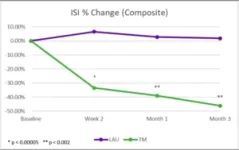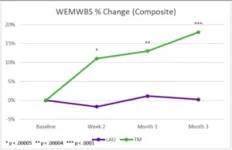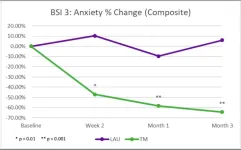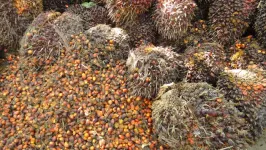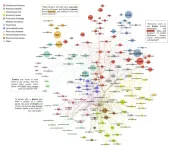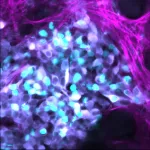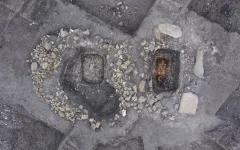(Press-News.org) Mason Associate Professor of Infectious Diseases and Microbiology, Ramin M. Hakami has received a total of $35,000 in grants from Intellifoods Labs, LLC to continue examining methods to reduce the time to detect the presence of bacteria in food samples.
Numbers and types of foodborne disease occurrences have increased over time and are a major global public health concern. Hakami and his team seek to reduce the time to identify both live and dead bacteria in food samples using fluorescence detection. The team aims to optimize the detection parameters for bacteria in food, and improve the sensitivity of detection. Researchers have also been examining whether there are extracellular vesicles from bacteria that are also released, which may serve as a diagnostic tool as well.
“Current conventional methods of detection are time consuming and laborious,” said Hakami. “By optimizing the detection process and reducing detection time, we can better prevent spread of foodborne pathogens and provide a safe food supply,” Hakami added.
According to Mohammed Fotouhi, CEO of IntelliFoods Labs, LLC, “the current technology and methods used at food testing labs take far too long to identify potential bacterial contaminants, costing the food industry and the world economy 100s of millions of dollars a year. If a better technology were available for food safety professionals, grocery stores, restaurants, and other food purveyors, we could see a more efficient and cheaper food production pipeline.”
“We are very excited to work with Dr. Hakami and his group for addressing this crucial need.” Fotouhi added.
Hakami, who is affiliated with Mason’s School of Systems Biology, also recently received funding for a natural immunity research effort using processed COVID-19 patient samples to explore natural mechanisms that are available to fight against COVID-19 infection and possibly additional respiratory infections.
“We encourage our scientists to consider novel points of view to uncover ways to leverage science for grand global impact,” said Mason College of Science Dean, Fernando Miralles-Wilhelm.
Both the Hakami Lab food bacterial detection project and COVID-19 natural immunity efforts will involve Mason Science student researchers.
END
Intellifoods Labs, LLC strengthens partnership with Mason scientists to reduce food bacterial contamination detection time
2023-03-03
ELSE PRESS RELEASES FROM THIS DATE:
Transcendental Meditation highly effective in rapidly reducing healthcare worker burnout symptoms during the height of the Covid crisis
2023-03-03
Healthcare providers (HCP) at three Miami hospitals during the height of the Covid crisis, who practiced the Transcendental Meditation technique (TM), showed a rapid and highly significant reduction in stress-related burnout symptoms such as somatization, depression, anxiety, sleep disturbances, and emotional exhaustion, as well as significant improvement in mental well-being, compared to a parallel matched lifestyle-as-usual group (LAU), according to a new study published today in PLOS ONE.
A total of 65 healthcare providers at the three Miami hospitals (Baptist, ...
Unique hybrid reefs deployed off Miami Beach
2023-03-03
The first piece of a series of concrete structures was lowered into the water off the coast of Miami Beach on Wednesday morning, a massive crane on the deck of a floating barge hoisting the unit into the air and sinking it to the seabed.
During the next six hours, crewmembers aboard the barge would repeat that process until the structures, some stacked on top of each other, were settled on the seafloor, 14 feet below the surface.
To casual observers onshore, the daylong operation might have seemed routine. But this maritime activity was hardly run-of-the-mill.
In ...
Scientist to launch interstellar space music
2023-03-03
A scientist from Anglia Ruskin University (ARU) will premiere a new piece of music at the SXSW EDU festival that has been created using data beamed back to Earth from interstellar space.
On Thursday, 9 March, Dr Domenico Vicinanza will be joined on stage in Austin, Texas, by Dr Alyssa Schwartz, Visiting Assistant Professor of Flute and Musicology at Fairmont State University, to perform music shaped by scientific readings collected by NASA’s Voyager 1 spacecraft.
Dr Vicinanza, a Senior Lecturer in ARU’s School of Computing and Information Science, is a leading expert ...
Mechanical weeding promotes ecosystem functions and profit in industrial oil palm
2023-03-03
Oil palm trees are the most productive oil crop and global demand is increasing. However, their productivity is due to conventional management practices including high fertilizer usage and herbicide application, resulting in severe environmental damage. A new study by an international, multidisciplinary research team led by the University of Göttingen, shows that shifting to mechanical weeding and reducing fertilizer usage lead to significant increases in both ecosystem multifunctionality and profit. The scientists compared different environmental measures and economic indicators in mechanical weeding, herbicide application, and combinations of these with high and reduced fertilizer ...
News you can use—to better predict food crisis outbreaks
2023-03-03
A team of researchers has developed a machine learning model that draws from the contents of news articles to effectively predict locations that face risks of food insecurity. The model, which could be used to help prioritize the allocation of emergency food assistance across vulnerable regions, marks an improvement over existing measurements.
“Our approach could drastically improve the prediction of food crisis outbreaks up to 12 months ahead of time using both real-time news streams and a predictive model that is simple to interpret,” says Samuel Fraiberger, a visiting researcher at ...
Tumour cells’ response to chemotherapy is driven by randomness
2023-03-03
Cancer cells have an innate randomness in their ability to respond to chemotherapy, which is another tool in their arsenal of resisting treatment, new research led by the Garvan Institute of Medical Research shows.
Understanding why some tumour cells become resistant to chemotherapy is a core challenge in cancer research, as chemotherapy is still a frontline treatment for most cancers.
The new research shows that tumour cells from neuroblastoma – cancer that develops in the body’s ‘fight or flight’ sympathetic nervous system – can move between states of responding, or not, to chemotherapy.
“We showed there is ‘noise’ in the process of cell ...
On social media platforms, more sharing means less caring about accuracy
2023-03-03
As a social media user, you can be eager to share content. You can also try to judge whether it is true or not. But for many people it is difficult to prioritize both these things at once.
That’s the conclusion of a new experiment led by MIT scholars, which finds that even considering whether or not to share news items on social media reduces people’s ability to tell truths from falsehoods.
The study involved asking people to assess whether various news headlines were accurate. But if participants were first asked whether they would share that content, they were 35 percent worse at telling truths from ...
The world’s first horse riders
2023-03-03
The researchers discovered evidence of horse riding by studying the remains of human skeletons found in burial mounds called kurgans, which were between 4500-5000 years old. The earthen burial mounds belonged to the Yamnaya culture. The Yamnayans had migrated from the Pontic-Caspian steppes to find greener pastures in today´s countries of Romania and Bulgaria up to Hungary and Serbia.
Yamnayans were mobile cattle and sheep herders, now believed to be on horseback.
“Horseback-riding seems to have evolved not long ...
Detecting anaemia earlier in children using a smartphone
2023-03-03
Researchers at UCL and University of Ghana have successfully predicted whether children have anaemia using only a set of smartphone images.
The study, published in PLOS ONE, brought together researchers and clinicians at UCL Engineering, UCLH and Korle Bu Teaching Hospital, Ghana to investigate a new non-invasive diagnostic technique using smartphone photographs of the eye and face.
The advance could make anaemia screening more widely available for children in Ghana (and other low- and middle-income countries) where ...
Israel: the origin of the world's grapevines
2023-03-03
A recent study on the genetic makeup of grapevine has revealed fascinating insights into its domestication and evolution. The study, published in the journal Science, suggests that the harsh climate during the Pleistocene era resulted in the fragmentation of wild ecotypes, which paved the way for the domestication of grapevine about 11,000 years ago in the Near East (Israel) and the Caucasus.
The research team sequenced the genomes of 3525 grapevine accessions (2503 V. vinifera (domesticated) and 1022 V. sylvestris (wild) accessions of grapevine, to identify the genetic changes that occurred during domestication and evolution of grapevine in Euro-Asia.
According to the study, ...

